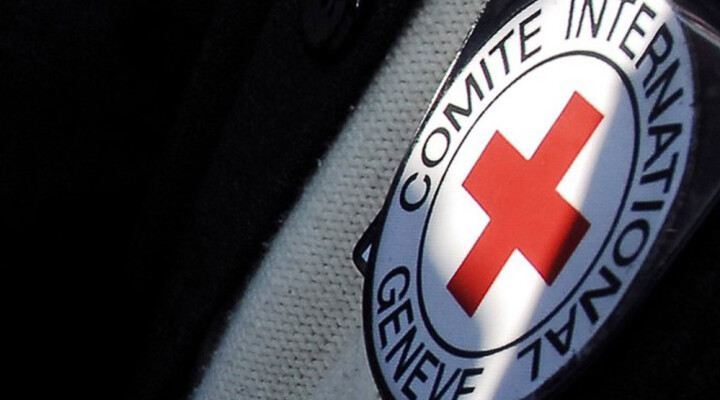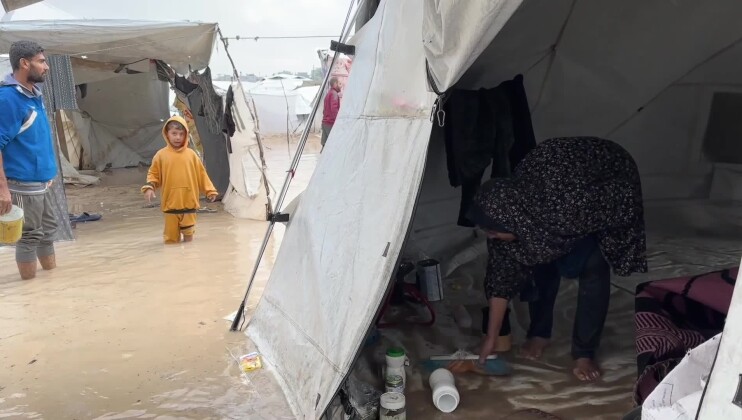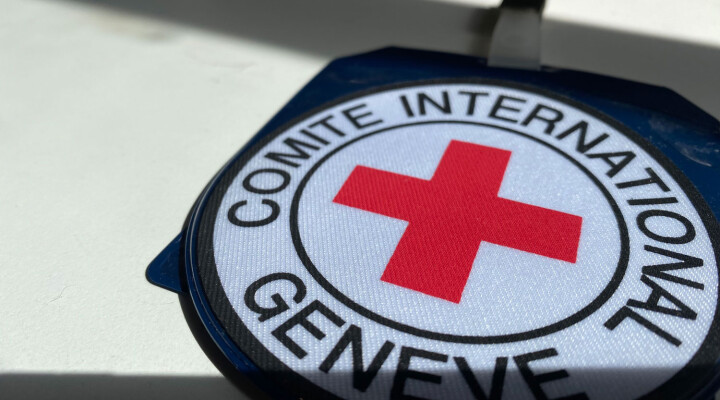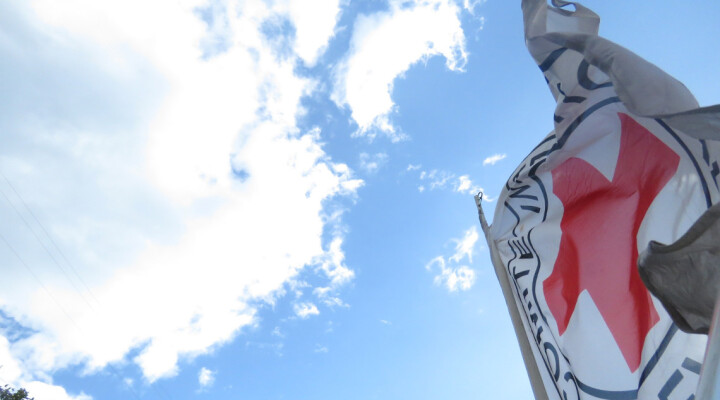Mali: ICRC President visits as climate change and conflict force people in the Sahel into desperate state
Mali faces overwhelming humanitarian challenges today. The population here simultaneously confronts the effects of conflict, climate change and a major food crisis. Taken together, these elements form a deadly loop.
Caught in the middle are millions of people.
More than 7.5 million people, a third of the population, need some form of assistance to survive. The situation is most critical to the 400,000 displaced people across the country, who have been forced from their homes because of violence. In Gao, where thousands have sought refuge and are now living in makeshift tents with no access to basic services, nearly everyone has a story of unimaginable suffering.
“I have seen people, communities that were displaced from their villages. Their villages were burned down. I’ve sat with women who came with their children sometimes even having to bury their children who lost their lives as they were fleeing their villages.”
On her first visit as president of the International Committee of the Red Cross, Mirjana Spoljaric travelled to Gao, where she spoke with men, women and children whose lives were ravaged by violence from all over the Sahel region.
“We all ran to the forest. Some women gave birth and had to abandon their children”
“In our flight, children were crying for food and water. People lost their lives to thirst.
Bintou Walet Fakana, a mother to ten children, had to flee her village after it was attacked. As the family walked to safety, her husband died of thirst. With her children and others from her village she was displaced multiple times as host communities already under pressure asked them to leave. In the process she also lost a son.
The conflict here is unfolding even as the worst food crisis to hit the country in over a decade ravages families. Climate shocks, erratic rain patterns and inflation are making the situation worse. 4.5 million people are facing malnutrition and more people are being pushed into poverty every day.
“People died here and we did not even have the means to buy a shroud with which to bury them”
“On top of violence, we were confronting the consequences of drought. Animals no longer had anything to eat, and neither did we. So we left Burkina Faso before things got worse”
“We came here in catastrophe. No one thought of taking their belongings, we are here with nothing”
“Our biggest need right now is clean water and food. Once we have this, we will then need healthcare and shelter”
Arab Ag Yaya is responsible for his commune at a displacement site in Kadji. His story is one of constant displacement since the 1990s. After finding peace as refugees in Burkina Faso for years, they were forced to return to Mali, where the situation is worsening. Violence seems to follow them everywhere.
For further information, please contact:
Tarek Wheibi, CICR Bamako, +221 78 18 64 687
twheibi@icrc.org
Christoph Hanger, CICR Genève, +41 79 731 04 03
changer@icrc.org
Jason Straziuso, CICR Genève, +41 79 949 3512
jstraziuso@icrc.org
SHOTLIST
Length: 8’41’’
Location: Gao, Mali
Date of Filming: 18th,19th,25th, October 2022
Camera: Sidi Boubacar, Halimatou Amadou, Mark Kamau
Copyright: ICRC access all
On Screen Credit: ICRC written or logo
00:00:00--> 00:00:03
Medium shot. Sosso Koira camp, Gao
00:00:03 --> 00:00:06
Medium shot. Woman and two girls in frame
00:00:06 --> 00:00:09
Medium shot. Bintou Walet Fakana seated with her grandchildren.
00:00:09 --> 00:00:13
Close up shot. Bintou Walet Fakana
00:00:13 --> 00:00:20
Interview: Bintou Walet Fakana, Internally displaced person at Sosso Koira Internally Displaced Persons camp.
The armed men arrived, they beat and killed all the men they found there.
00:00:20 --> 00:00:38
They burned the houses into straws, tore down the sleeping mats, destroyed the water containers and food. They destroyed everything.
00:00:38 --> 00:00:43
Medium shot. Sosso Koira Camp at sunset with silhouettes of people walking in the foreground.
00:00:43 --> 00:00:48
Longs shot. Sosso Koira Camp at sunset with silhouettes of people walking in the foreground.
00:00:48 --> 00:00:53
Medium shot. Exterior. Bintou Walet Fakana tent at night.
00:00:53 --> 00:00:58
Interview: Bintou Walet Fakana, Internally displaced person at Sosso Koira, Gao, Mali.
We all ran to get back into the forest; women gave birth and abandoned their children;
00:00:58 --> 00:01:22
We walked all night. Children were crying and asking for drinking water, people lost their lives because of thirst.
00:01:22 --> 00:01:26
Long shot. Bintou Walet Fakana sweeping outside her tent.
00:01:26 --> 00:01:32
Medium shot.Interview: Bintou Walet Fakana sweeping outside her tent.
00:01:32 --> 00:01:35
Medium shot. A woman feeding her child
00:01:35 --> 00:01:39
Long shot. Sosso Koira
00:01:39 --> 00:01:46
Medium shot. Bawa Camp
00:01:46 --> 00:02:00
Various Shots. ICRC President Mirjana Spoljaric speaking with members of community at the Sosso Koira Camp.
00:02:00 --> 00:02:02
Interview FRENCH (English take follows). ICRC President Mirjana Spoljaric.
Je suis venu à Gao parce que cette région
00:02:02 --> 00:02:05
ici reflète tout ce qui se
passe dans le Sahel.
00:02:05 --> 00:02:12
Actuellement,
il y a une population ici qui se trouve
00:02:12 --> 00:02:18
entre violence armée
et des impacts du changement climatique.
00:02:18 --> 00:02:23
Ce qui amène les gens à se déplacer dans
Des hautes chiffres dans tout le Sahel.
00:02:23 --> 00:02:38
Interview English take. ICRC President Mirjana Spoljaric:
I have seen people, communities that were displaced from their villages. Their villages were burned down. I’ve sat with women who came with their children sometimes even having to bury their children who lost their lives as they were fleeing from their villages.
00:02:38 --> 00:02:43
Long Shot. Unfinished frame of a temporary dwelling at Sosso Koira camp. Women dragging a can of water in the foreground.
00:02:43 --> 00:02:58
Various Shots. Two women building a temporary dwelling at Sosso Koira camp
00:02:58 --> 00:03:15
Various Shots. ICRC President Mirjana Spoljaric speaking with members of community at the Sosso Koira Camp.
00:03:15 --> 00:03:19
Close up shot. Sallah Ag Yehya, Chief of the Kadji Internally Displaced Persons site.
00:03:19 --> 00:03:51
Interview. Sallah Ag Yehya, Chief of the Kadji Internally Displaced Persons site.
People died here and we didn't even have enough money to buy a shroud for the burial. I was forced to take the shroud fabric on credit from the sellers.
00:03:51 --> 00:04:06
Various Shots. Woman preparing food at t Sosso Koira camp.
00:04:06 --> 00:04:44
Interview. Sallah Ag Yehya, Chief of the Kadji Internally Displaced Persons site.
In addition to the conflict, we were confronted with the consequences of the drought. The animals didn't have any food and we didn't have any more, so we left Burkina before things got worse.
00:04:44 --> 00:04:47
Medium shot. Gao Hospital gate.
00:04:47 --> 00:04:52
Medium shot. Car and motorcycle driving into Gas hospital.
00:04:52--> 00:05:03
Various shots. Patients and carers staying along the corridors of Gao hospital.
00:05:03 --> 00:05:07
Interview FRENCH (English take follows). ICRC President Mirjana Spoljaric:
Mais ce que je vois aussi et je me
trouve ici devant l'hôpital de Gao.
00:05:07 --> 00:05:08
C'est la pression
00:05:09 --> 00:05:14
sur l'accès à l'eau pour
maintenir le même niveau
00:05:14 --> 00:05:20
sur l'accès à l'eau pour
maintenir le même niveau
00:05:20 --> 00:05:25
de services médicaux,
le même accès à l'eau pour tout le monde.
00:05:25 --> 00:05:31
Tout d'abord aussi, la population d'ici,
la société qui vit ici.
00:05:31 --> 00:05:35
Nous devons veiller à ne pas créer
des ressentiments entre ceux qui doivent
00:05:35 --> 00:05:41
se déplacer, qui ne peuvent pas retourner
à cause de cette violence persistante,
00:05:41 --> 00:05:44
et ceux qui sont aussi
sous de graves pressions
00:05:44 --> 00:05:48
et risque de tomber
dans des vulnérabilités beaucoup plus
00:05:48, --> 00:05:52
graves que celles dans lesquelles il
se trouve des gens.
00:05:52 --> 00:06:35
Interview English take. ICRC President Mirjana Spoljaric:
I see the pressure is rising by the numbers of displaced people on the local infrastructure, in terms of health but also other social services. this has oo b kind of mitigated so that we don’t see resentment arising between the local population which is also very poor and also suffering from a high level of Poverty vis-avis those displaced who come for aid. Right now we see a high level of solidarity but if this situation continues we will see more people in need and we will see the local population even in much more need than we see it today
00:06:35 --> 00:06:56
Interview. Sallah Ag Yehya, Chief of the Kadji Internally Displaced Persons site.
Our greatest need is drinking water and food. Once these needs are met, we will need health care and shelter.
00:06:56 --> 00:07:15
Interview: Bintou Walet Fakana, Internally displaced person at Sosso Koira Internally Displaced Persons camp, Gao, Mali.
Wherever we go, we are asked to leave the place, we don't know where to go: We thought we had found refuge here, the people of the city also want to chase us. Where will we go?
00:07:15 --> 00:08:00
Various interior and exterior shots. Sosso Koira Internally Displaced Persons camp.
00:08:00 --> 00:08:15
Various shots. People and boats at Niger River in Gao.
00:08:15 --> 00:08:35
Various shots. Tomb of Askia in Gao.
00:08:35,--> 00:08:41
Long shot. Traffic at a monument in Gao
Ends



